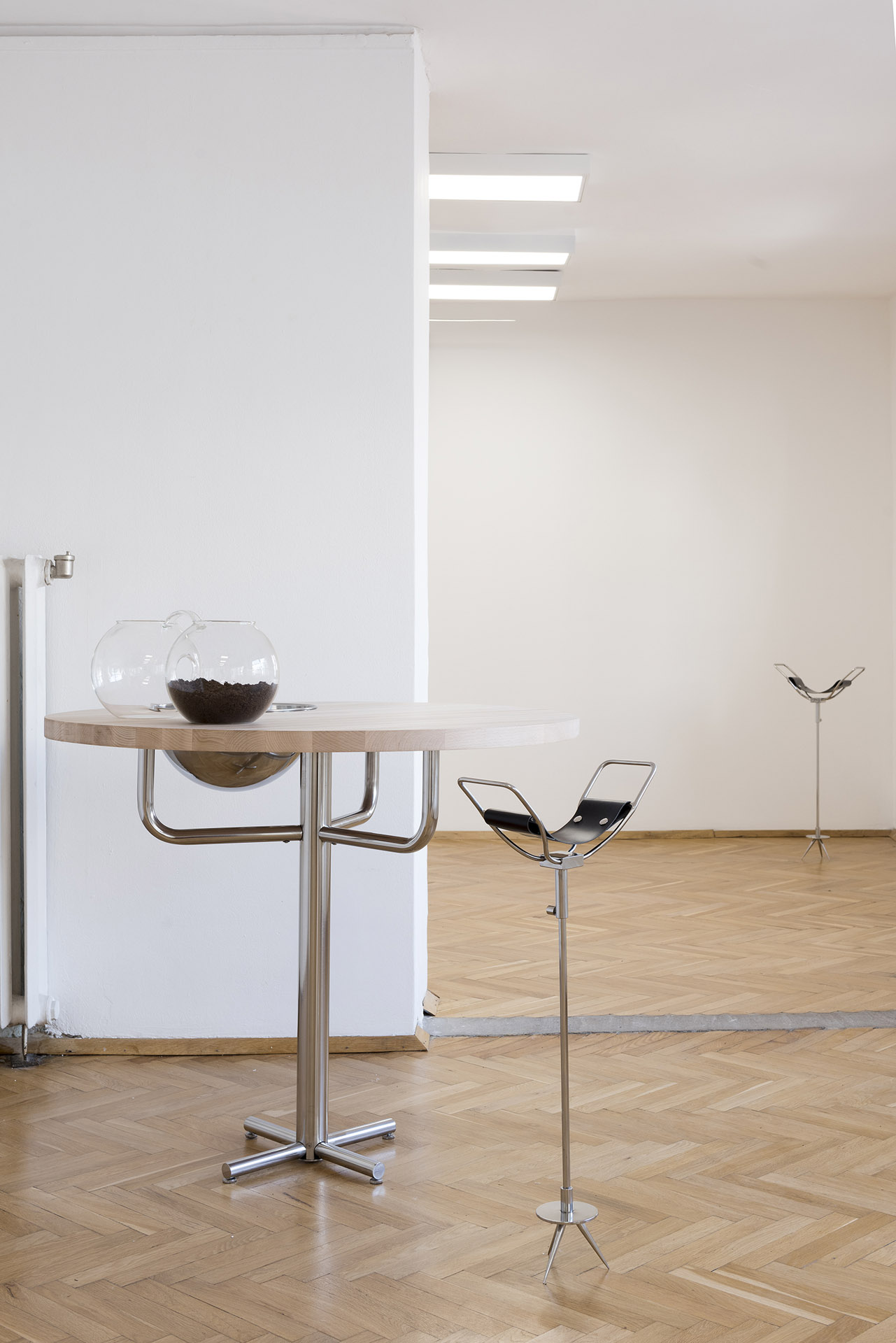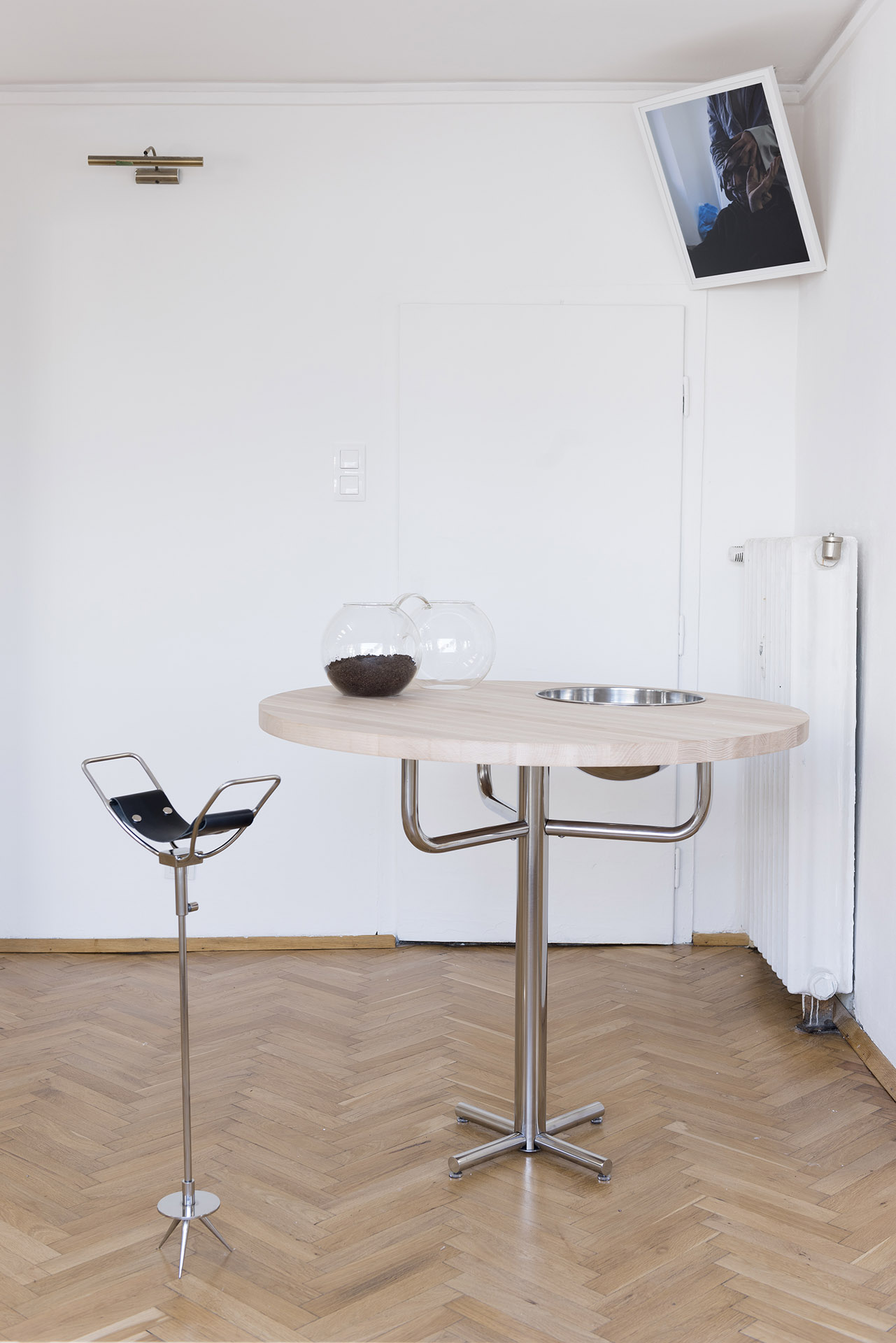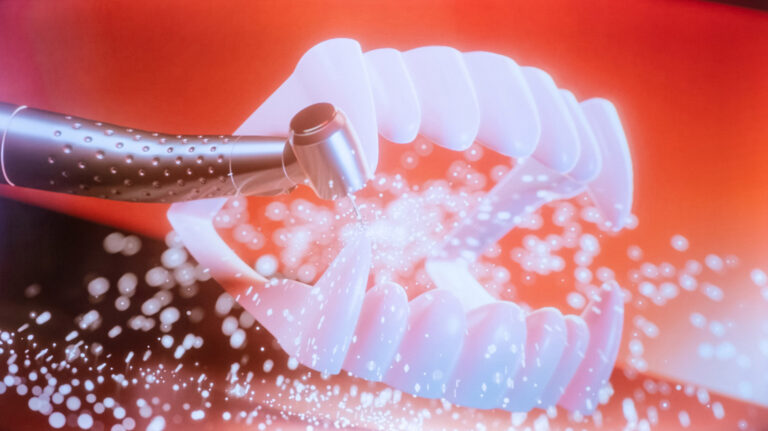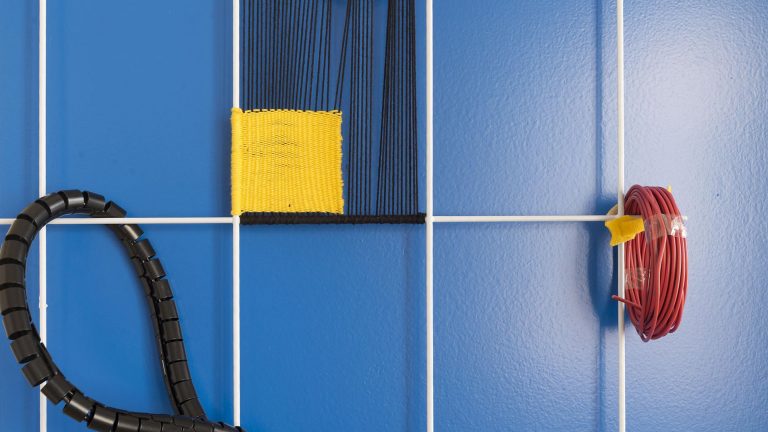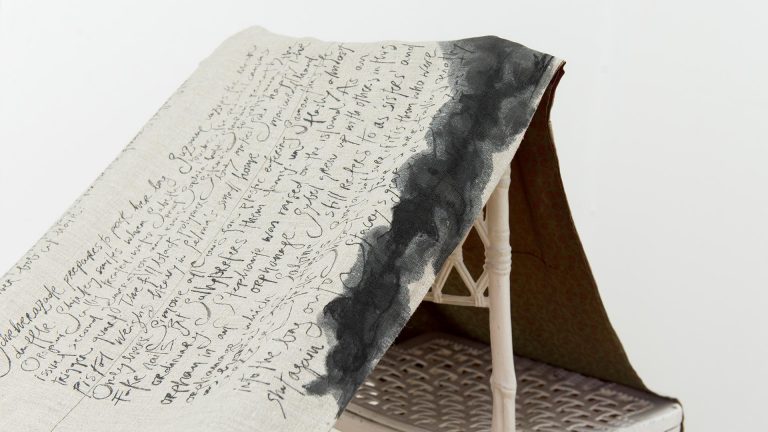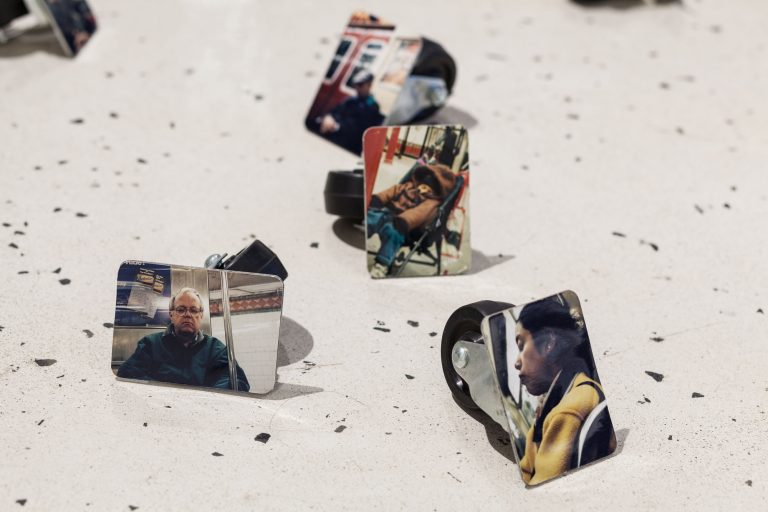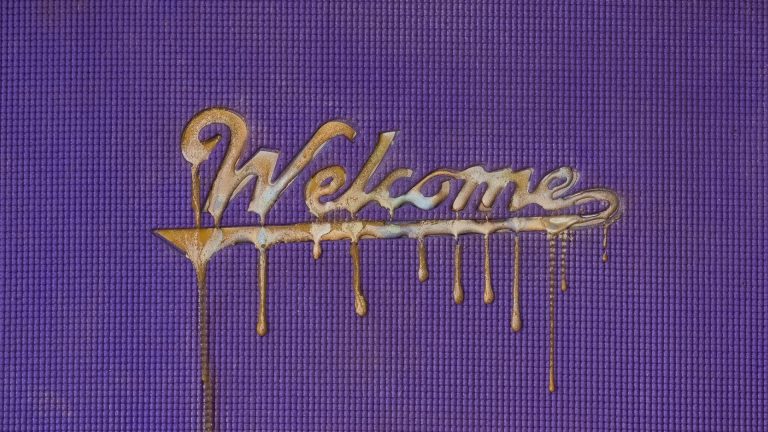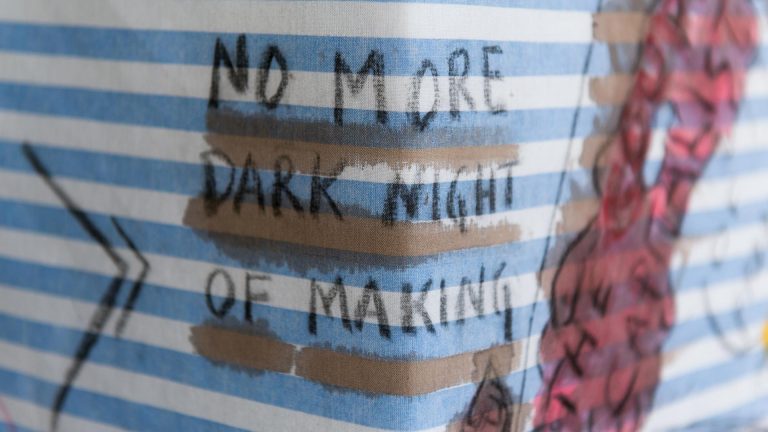Artists: Dorota Gawęda, Eglė Kulbokaitė
Exhibition title: there is not, there is not a soul
Curated by: Viktoria Draganova
Venue: Swimming Pool, Sofia, Bulgaria
Date: June 24 – July 31, 2021
Photography: © The artists & Swimming Pool. Photo: Yana Lozeva
Swimming Pool is delighted to present there is not, there is not a soul, an exhibition by artist duo Dorota Gawęda and Eglė Kulbokaitė. For their show in Sofia, the artists consider topics around the ecology of landscape and eco-feminism as they relate to urban legends, witch trials, and Eastern European folklore.
Central to the show is the video work “Mouthless Part I” which stems from the artists’ ongoing involvement with YOUNG GIRL READING GROUP – a community project initiated by Gawęda and Kulbokaitė that looks for a different way of approaching text, reading, and sharing knowledge. YGRG inspires the film’s serial and fragmented form, as well as its use of collective reading practices as a narrative trigger. Aesthetically, Gawęda and Kulbokaitė are interested in the horror genre as a vehicle for exploring the fear attributed to being outside or other (as related to norm, society, etc.). Within this convention they consider the construction of the deviant subject and conversely monstrification and othering of nature as intertwined phenomena. Horror, and folk horror in particular, embodies an explicitly ecological worldview in which human and nature, human and nonhuman, are thoroughly imbricated. “Mouthless Part I” also implements the artists’ current research into witchcraft as a transcultural and transhistorical signifier across disciplinary, social, geographic, and traditional boundaries. Another important aspect is the film’s inclusion of various spirits and creatures from Eastern European history and mythology.
The video work is accompanied by photography and sculpture. The photographs use behind the scenes footage from “Mouthless Part I” to depict the moment when those participating in the reading transform into monsters. The concept of metamorphosis plays a key role in the body of sculptures as well. Gawęda and Kulbokaitė have previously included the pieces on view at Swimming Pool in different performances surrounding the film piece to build an ambiance that acts as a moment of trespassing, or of crossing a boundary, possibly between the living and the dead. However, due to their nature of abstract, non-functional furniture, the sculptures create another kind of home that is mostly uncanny. A few additional objects – such as the glass double pots – originate from the symbolic / ritualistic realm and thus evoke the scientific framing of Gawęda and Kulbokaitė’s work, or the absence of such.
There is one more perspective that the exhibition touches upon since the series of works Spectator(s) is a comment on how we relate to nature. The objects take inspiration from the golfing chairs which one carries and positions to observe a landscape. Here these are transformed into free-standing objects, also referencing the chicken legs of a witch’s house. The moment of observing and framing remains crucial as it relates to the artists’ role in shaping the landscape through their gaze by defining nature as “other”.
In relation to the exhibition there is not, there is not a soul, the artists Dorota Gawęda and Eglė Kulbokaitė ran YOUNG GIRL READING GROUP 171 on June 25. At Swimming Pool, YGRG 171 read selected chapters from Dark Ecology: For a Logic of Future Coexistence by Timothy Morton and Witchcraft and Demonology in Hungary and Transylvania, ed. by Gábor Klaniczay and Éva Pócs.
YOUNG GIRL READING GROUP is a project initiated by Gawęda and Kulbokaitė which came into existence as an actual, weekly reading group in their Berlin flat in 2013. Since then, under this extended serial performative project, the artists have organized more than 160 reading groups and performances at a sustained pace and at a large variety of locations.
YGRG has not so much to do with being young or being a girl. It started from a collective reading of texts which explore broadly the intersections between gender and technology, the first of which was Tiqqun’s 1999 publication Preliminary Materials For a Theory of the Young-Girl. This text proposes the concept of the Young-Girl, a category identified as neither age nor gender-specific, but rather as a product of consumer society and the epitome of its model citizen. Since, YGRG has been tending towards texts that expose how our identities are often fabricated without our knowing — and how we could also understand, subvert, and reclaim them. YGRG investigates the act of reading as an intimate experience and also potentially a public performance through the “outlouding” of words. We read together, pronouncing the words out loud and emphasizing the relationship of the body of text to the collective body.
Dorota Gawęda (b. 1986, PL) and Eglė Kulbokaitė (b. 1987, LT) are an artist duo based in Basel (CH). They work within a variety of media spanning performance, photography, installation, fragrance, sculpture, text and video. Gawęda and Kulbokaitė are MA graduates of the Royal College of Art, London (2012), and have been working together since 2013. In their work, the duo explore artistic production through collaboration and search for aberrant media that lend themselves to creating speculative environments. Formally, Gawęda and Kulbokaitė explore incompleteness and linguistic ingraspability, apparent both in their approach to performance as in the sculptural objects and environments that they propose, offering ways to renegotiate our complex relationship to Nature – ecological system that we have historically defined as separate to ourselves, as outside. Their recent solo shows include: Julia Stoschek Collection, Düsseldorf (solo/film screenings, 2020); Body Archive, Zurich (2020); Trafo Gallery, Budapest (2020); Amanda Wilkinson Gallery, London (2020 and 2018); Fri Art – Centre d’Art de Fribourg / Kunsthalle Fribourg and Wallriss (2020); Futura, Prague (2019); Lucas Hirsch Gallery, Düsseldorf (2019); Cell Project Space, London (2018). Upcoming exhibitions include: Eat the Museum, Alte Fabrik, Rapperswil (group, 2020); MOUTHLESS (DZIADY), On Curating project space, Zürich (solo, 2020), Swiss Performance Award presentation, Le Grütli, Geneva (shortlisted, 2020), Lucas Hirsch Gallery, Düsseldorf (solo, 2020), Istituto Svizzero, Milan (screening/performance, 2020). Gawęda and Kulbokaitė are also the founders of YOUNG GIRL READING GROUP (2013-).
With the support of the Swiss Arts Council Pro Helvetia and the Bulgarian Fund for Women. The artists’ work is supported by the Lithuanian Council for Culture. In 2021, the activity of Swimming Pool, represented by the Blue Cube Foundation, is supported by the National Culture Fund.
Dorota Gawęda and Eglė Kulbokaitė, Installation view “there is not, there is not a soul” at Swimming Pool, Sofia, 2021
Dorota Gawęda and Eglė Kulbokaitė, Installation view “there is not, there is not a soul” at Swimming Pool, Sofia, 2021
Dorota Gawęda and Eglė Kulbokaitė, Leave no trace II, 2018. Polished stainless steel, myrrh, sampling bottle, headspace needle, saliva, lighter, 140 x 120 x 40 cm
Dorota Gawęda and Eglė Kulbokaitė, Installation view “there is not, there is not a soul” at Swimming Pool, Sofia, 2021
Dorota Gawęda and Eglė Kulbokaitė, Installation view “there is not, there is not a soul” at Swimming Pool, Sofia, 2021
Dorota Gawęda and Eglė Kulbokaitė, Embrace (Backstage), 2020. Inkjet print on archival paper, 40 x 50 cm
Dorota Gawęda and Eglė Kulbokaitė, Ilgės, 2020. Wood, stainless steel. / Spectator (I-II), 2020. Polished stainless steel, print on leather, 80 x 36 x 12 cm. / Dwojaki I, 2020. Precision glass utensils, local soil, 40 x 40 x 20 cm
Dorota Gawęda and Eglė Kulbokaitė, Ilgės, 2020. Wood, stainless steel. / Spectator (I-II), 2020. Polished stainless steel, print on leather, 80 x 36 x 12 cm. / Dwojaki I, 2020. Precision glass utensils, local soil, 40 x 40 x 20 cm
Dorota Gawęda and Eglė Kulbokaitė, Installation view “there is not, there is not a soul” at Swimming Pool, Sofia, 2021
Dorota Gawęda and Eglė Kulbokaitė, Installation view “there is not, there is not a soul” at Swimming Pool, Sofia, 2021
Dorota Gawęda and Eglė Kulbokaitė, Leave no trace I, 2018. Polished stainless steel, 120 x 40 x 40 cm (detail)
Dorota Gawęda and Eglė Kulbokaitė, Spectator II, 2020. Polished stainless steel, print on leather, 80 x 36 x 12 cm (detail)
Dorota Gawęda and Eglė Kulbokaitė, Installation view “there is not, there is not a soul” at Swimming Pool, Sofia, 2021
Dorota Gawęda and Eglė Kulbokaitė, Installation view “there is not, there is not a soul” at Swimming Pool, Sofia, 2021
Dorota Gawęda and Eglė Kulbokaitė, Installation view “there is not, there is not a soul” at Swimming Pool, Sofia, 2021
Dorota Gawęda and Eglė Kulbokaitė, Reader (Azur), 2020. inkjet print on archival paper, 61 x 91 cm
Dorota Gawęda and Eglė Kulbokaitė, Installation view “there is not, there is not a soul” at Swimming Pool, Sofia, 2021
Dorota Gawęda and Eglė Kulbokaitė, Mouthless Part I, 2020. Video 45:26 min
Dorota Gawęda and Eglė Kulbokaitė, Mouthless Part I, 2020. Video 45:26 min
Dorota Gawęda and Eglė Kulbokaitė, Mouthless Part I, 2020. Video 45:26 min
Dorota Gawęda and Eglė Kulbokaitė, Sselhtuom, 2021.Site-specific intervention, mirror
Dorota Gawęda and Eglė Kulbokaitė, Sselhtuom, 2021.Site-specific intervention, mirror
Dorota Gawęda and Eglė Kulbokaitė, Dwojaki II, 2020. Precision glass utensils, local soil, 40 x 40 x 20 cm
Dorota Gawęda and Eglė Kulbokaitė, Sselhtuom, 2021.Site-specific intervention, mirror
Dorota Gawęda and Eglė Kulbokaitė, Unknown (Fribourg City Archives), 2020. Inkjet print on archival paper, 61 x 91 cm








